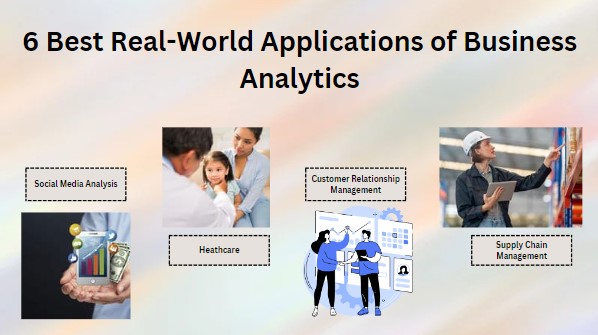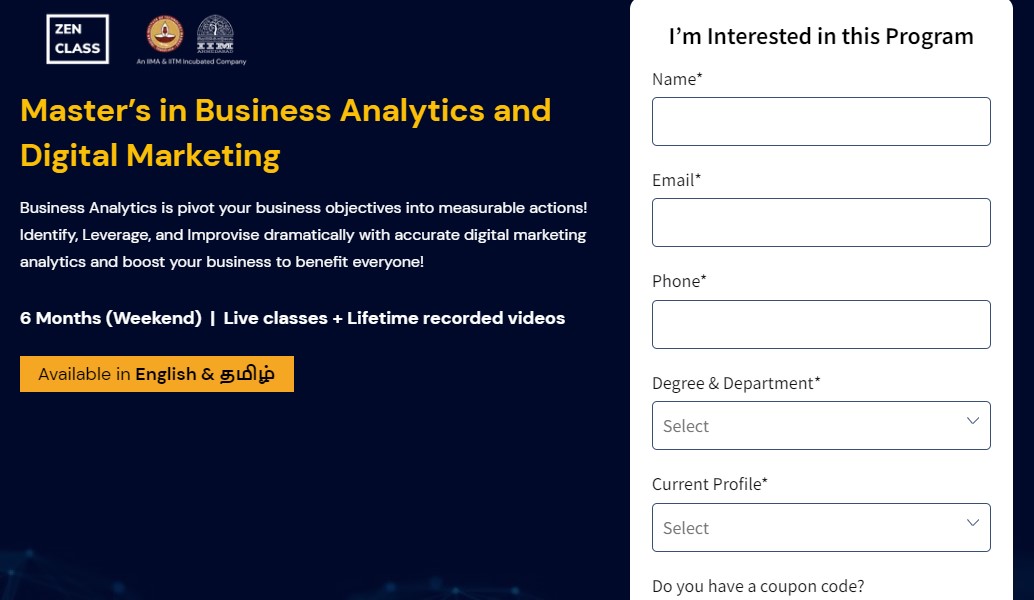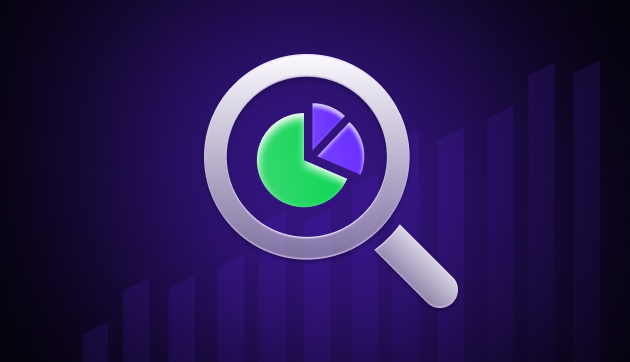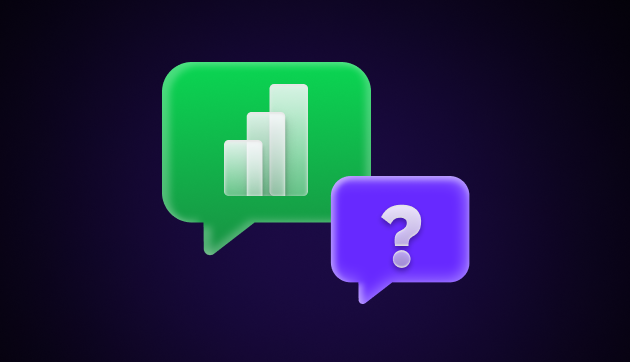
6 Best Real-World Applications of Business Analytics
Mar 15, 2025 4 Min Read 7349 Views
(Last Updated)
In today’s era, businesses depend on business analytics for their growth and that is the reason why business analytics are in such huge demand. Business analytics help industries in making better decisions in terms of their finances, operations, and many other things. Since, we all know that in today’s world, data has become indispensable. Therefore, every business is in search of professionals who can work on analyzing data and draw valuable insights from them.
Business analytics has been used by industries for various applications. To help you understand some of the best real-world applications of business analytics, we have articulated this blog. This blog will talk about its applications and how they function. But before we know about its applications, let’s take a step back and read about what business analytics actually means.
Table of contents
- What is Business Analytics?
- Real-World Application of Business Analytics in Different Industries
- Use of predictive modeling in the healthcare industry
- Customer segmentation for retail businesses
- Fraud detection in financial services
- Supply chain optimization for manufacturing companies
- Social media analysis for marketing campaigns
- Customer Relationship Management for Sales and Marketing
- Benefits of Using Business Analytics in Decision-Making
- Future Applications of Business Analytics: Trends and Predictions
- Importance of Continued Education and Skill Development in Business Analytics
- Conclusion
- FAQs
- Q1. What are the real-world applications of business analytics?
- Q2. What are the applications of business analytics in marketing?
- Q3. What is the application of business analytics in Netflix?
- Q4. How does Spotify use analytics?
What is Business Analytics?
Business Analytics is the practice of utilizing data, statistical methods, and technology to extract meaningful insights and make decisions accordingly. The steps involved in it include collection, analysis, interpretation, and presentation of data to help businesses grow in various aspects. Data management, data visualization, predictive modeling, data mining, forecasting simulation, and optimization are some of the tools used to create insights from data.
Data-driven decision-making helps in problem-solving, supports innovation and experimentation, enhanced efficiency and continuous improvement. Technology plays a crucial role in business analytics, enabling organizations to collect, process, analyze, and derive insights from vast amounts of data. By leveraging the right technologies, businesses can gain a competitive edge, drive innovation, and make data-driven decisions to achieve their strategic objectives.
Business analytics has been used in various industries in different domains like energy and fuel, agriculture, finance, retail trading, etc. Companies like Microsoft, Netflix, Uber, etc. use business analytics for their growth. By embracing analytics, businesses can drive growth, gain a competitive edge, and seize new opportunities in today’s data-driven business landscape.
Before we move to the next part, you should have a deeper knowledge of business analytics concepts. You can consider enrolling yourself in GUVI’s Business Analytics and Digital Marketing Career Program, which lets you gain practical experience by developing real-world projects and covers technologies including Power BI, Excel, SQL, Tableau, Data Visualization, etc.
Real-World Application of Business Analytics in Different Industries
Business analytics have been used in various disciplines of industries for their continuous growth. Let’s read about some of the best real-world applications of business analytics in different industries.
1. Use of predictive modeling in the healthcare industry
Predictive modeling is widely used in the healthcare industry to improve patient care, optimize resource allocation, and enhance operational efficiency. Some of the important applications of predictive modeling in healthcare are disease risk prediction, patient outcomes and treatment response, early detection of healthcare-associated infections, readmission of risk, hospital resource management, and resource planning and capacity management.
In this way, business analytics can help the healthcare industry grow its business by having an estimated prediction of data-related operations. Predictive modeling in healthcare enables data-driven decision-making, enhances patient care, improves resource allocation, and contributes to better health outcomes. It helps healthcare providers identify high-risk patients, optimize treatments, and allocate resources efficiently, ultimately leading to improved patient outcomes and more effective healthcare delivery.
2. Customer segmentation for retail businesses
Customer segmentation is a powerful strategy used by retail businesses to divide their customer base into distinct groups based on shared characteristics. By segmenting customers, retailers can better understand their diverse needs, preferences, and behaviors, allowing for targeted marketing efforts and personalized experiences. Some of the common approaches to customer segmentation for retail businesses are demographic, geographic, behavioral, benefit-based, usage-based, etc.
It’s important for retail businesses to select the segmentation criteria that align with their specific industry, products, and customer base. By implementing effective customer segmentation strategies, retailers can deliver targeted marketing campaigns, personalized experiences, and relevant product offerings, ultimately enhancing customer satisfaction, and loyalty, and driving business growth.
3. Fraud detection in financial services
Fraud detection is a critical aspect of risk management for financial services organizations. The rapidly evolving nature of fraud requires advanced techniques and technologies to detect and prevent fraudulent activities. Some of the key methods and approaches used are pattern recognition, Machine Learning, and AI, Identity verification, continuous model updating, etc.
The combination of advanced technologies, data analytics, and industry collaboration is crucial for effective fraud detection in financial services. By implementing robust fraud detection measures, organizations can mitigate risks, protect customers, and safeguard the integrity of their operations.
4. Supply chain optimization for manufacturing companies
Supply chain optimization is a critical focus area for manufacturing companies to enhance operational efficiency, reduce costs, and improve customer satisfaction. It involves streamlining processes, minimizing waste, and optimizing the flow of goods and information across the supply chain. Some of the key strategies and approaches are inventory management, demand planning and forecasting, supplier collaboration, production planning and scheduling, data analytics, and visibility.
By adopting these strategies and approaches, manufacturing companies can optimize their supply chain operations, reduce costs, improve delivery performance, and gain a competitive advantage in the market. Supply chain optimization enables manufacturers to meet customer expectations, respond to market dynamics, and drive sustainable growth.
5. Social media analysis for marketing campaigns
Social media analysis plays a crucial role in shaping effective marketing campaigns. By leveraging social media data, marketers can gain insights into customer behavior, preferences, and sentiments, enabling them to optimize their marketing strategies. Some of the key ways social media analysis can benefit marketing campaigns – are audience insights, competitor analysis, campaign performance management, content strategy optimization, customer feedback, and social advertising optimization.
By leveraging social media analysis, marketers can gain actionable insights, make informed decisions, and create more impactful marketing campaigns. Social media platforms provide a wealth of data that when effectively analyzed, can drive audience engagement, increase brand awareness, and generate measurable business results.
6. Customer Relationship Management for Sales and Marketing
Customer Relationship Management (CRM) is a strategy and set of practices that help sales and marketing teams manage and nurture relationships with customers throughout their lifecycle. CRM systems and processes enable organizations to gather, analyze, and leverage customer data to improve customer satisfaction, drive sales, and enhance marketing efforts. Some key aspects of CRM for sales and marketing include sales pipeline management, customer data management, sales and performance analytics, automation, and workflow.
CRM plays a pivotal role in aligning sales and marketing efforts, enhancing customer relationships, and driving revenue growth. By leveraging CRM systems and practices, organizations can optimize their sales and marketing strategies, improve customer engagement, and foster long-term customer loyalty.
Benefits of Using Business Analytics in Decision-Making
Using business analytics in decision-making offers several benefits to organizations. Here are some key advantages:
- Improved Strategic Planning
- Enhanced Operational Efficiency
- Real-Time Monitoring and Performance Tracking
- Improved Financial Performance
- Competitive Advantage
- Innovation and Continuous Improvement
Future Applications of Business Analytics: Trends and Predictions
Business analytics is a rapidly evolving field, and several trends and predictions shape its future applications. Here are some key trends and predictions for the future of business analytics:
- ML and AI
- Big Data and IoT Integration
- Advanced Visualization and Data Storytelling
- Industry-Specific Analytics Solutions
- Collaborative Analytics
Overall, the future of business analytics holds promising advancements in AI and ML, the integration of big data and IoT, real-time analytics, advanced visualization techniques, ethics, and privacy considerations, industry-specific solutions, augmented analytics, and collaborative analytics. These trends will shape the future of business analytics, enabling organizations to harness the power of data and derive meaningful insights for better decision-making and business outcomes.
If you’re a digital marketing person, wondering how business analytics could help you, here are 6 Reasons Business Analytics makes Digital Marketing Powerful
Importance of Continued Education and Skill Development in Business Analytics
Continued education and skill development are essential in business analytics to keep up with technological advancements, enhance analytical skills, adapt to changing business needs, expand knowledge of advanced techniques, bridge the skills gap, get placement assistance, foster networking and collaboration, and stay ahead of the competition. By investing in their education, professionals can continually improve their expertise and contribute to the success of organizations leveraging data-driven strategies.
If you’re looking for a course that could help you to learn business analytics with digital marketing, here’s one for you – GUVI’s Master’s in Business Analytics and Digital Marketing. This is a complete program of 6 months (every weekend) that offers live classes and lifetime recorded videos that can be completed at your own pace and place. With a flexibility to learn in English and Tamil, master top technologies including PowerBI, Excel, SQL, Tableau, Data Visualization, etc.
Conclusion
Business analytics has a wide range of applications across various industries and functional areas. By leveraging data and advanced analytics techniques, organizations can gain valuable insights that drive business growth, improve financial performance, and foster innovation. Read about the 6 best business analytics applications that industries use in different sectors. Business analytics is a powerful tool that empowers organizations to make data-driven decisions, gain a competitive advantage, and stay ahead in today’s dynamic business landscape.
FAQs
Ans. The possibilities in business analytics are endless. It has many applications in the real world – from optimizing supply chains to making product recommendations based on customer behavior to identifying patterns in sales forecasting.
Ans. Some of the major applications of business analytics in marketing are –
1. Campaign Performance Analysis
2. Social Media Analytics
3. Market Basket Analysis
4. Customer Lifetime Value (CLV) Analysis
Ans. Netflix uses AI-powered algorithms to make predictions based on the user’s watch history, search history, demographics, ratings, and preferences. These predictions show with 80% accuracy what the user might be interested in seeing next.
Ans. Using CNN, Spotify analyzes raw audio data such as the song’s BPM, musical key, loudness, etc., to classify songs based on music type and further optimize its recommendation engine.
































Did you enjoy this article?